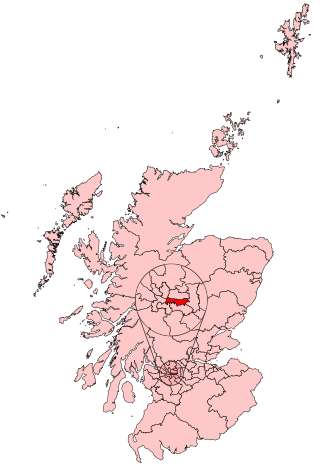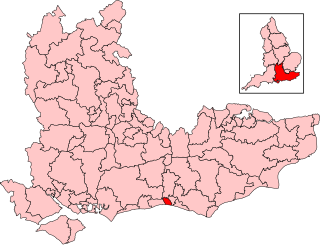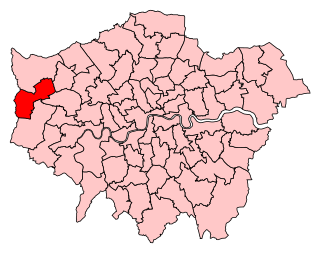Related Research Articles
An election exit poll is a poll of voters taken immediately after they have exited the polling stations. A similar poll conducted before actual voters have voted is called an entrance poll. Pollsters – usually private companies working for newspapers or broadcasters – conduct exit polls to gain an early indication as to how an election has turned out, as in many elections the actual result may take many hours to count.

South Antrim is a parliamentary constituency in the United Kingdom House of Commons. The current MP is Robin Swann of the Ulster Unionist Party (UUP), first elected in the 2024 general election.
An electoral swing analysis shows the extent of change in voter support, typically from one election to another, expressed as a positive or negative percentage. A multi-party swing is an indicator of a change in the electorate's preference between candidates or parties, often between major parties in a two-party system. A swing can be calculated for the electorate as a whole, for a given electoral district or for a particular demographic.

St Albans is a constituency in Hertfordshire represented in the House of Commons of the UK Parliament since 2019 by Daisy Cooper, a Liberal Democrat.

Glasgow East is a constituency of the House of Commons of the UK Parliament, located in the city of Glasgow, Scotland. It elects one Member of Parliament at least once every five years using the first-past-the-post system of voting. It is currently represented by John Grady of the Labour Party who has been the MP since 2024.

Glasgow North East is a burgh constituency of the House of Commons of the Parliament of the United Kingdom. It was first contested at the 2005 general election. The current Member of Parliament (MP) is Maureen Burke of the Labour Party who gained the seat from Scottish National Party's Anne McLaughlin at the 2024 general election.

Boston and Skegness is a constituency in Lincolnshire represented in the House of Commons of the UK Parliament by Richard Tice of Reform UK since the 2024 general election. Like all British constituencies, it elects one Member of Parliament (MP) by the first-past-the-post system of election. Prior to Tice's election, it was considered a safe seat for the Conservatives.

Twickenham is a constituency in Greater London represented in the House of Commons of the UK Parliament since 2019 by Munira Wilson of the Liberal Democrats.

Harrow West is a constituency in Greater London created in 1945 and represented in the House of Commons of the UK Parliament. Until 1997, it only returned Conservative MPs; since then, it has elected the Labour Co-operative MP Gareth Thomas on a fluctuating majority. Since 2010, this has been bolstered by the loss of Pinner from the seat and the gain of a favourable ward for Labour from Harrow East.

Hove and Portslade is a borough constituency in East Sussex represented in the House of Commons of the UK Parliament since 2015 by Peter Kyle of the Labour Party, who currently serves as Secretary of State for Science, Innovation and Technology in the government of Keir Starmer.

The 2005 United Kingdom general election was held on Thursday 5 May 2005, to elect 646 members to the House of Commons. The governing Labour Party led by Prime Minister Tony Blair won its third consecutive victory, with Blair becoming the second Labour leader after Harold Wilson to form three majority governments. However, its majority fell to 66 seats; the majority it won four years earlier had been of 167 seats. The UK media interpreted the results as an indicator of a breakdown in trust in the government, and especially in Blair.

The 2010 United Kingdom general election was held on Thursday 6 May 2010, to elect Members of Parliament to the House of Commons. The election took place in 650 constituencies across the United Kingdom under the first-past-the-post system. The election resulted in a large swing to the opposition Conservative Party led by David Cameron similar to that seen in 1979, the last time a Conservative opposition had ousted a Labour government. The governing Labour Party led by Prime Minister Gordon Brown lost the 66-seat majority it had previously enjoyed, but no party achieved the 326 seats needed for a majority. The Conservatives won the most votes and seats, but still fell 20 seats short. This resulted in a hung parliament where no party was able to command a majority in the House of Commons. This was only the second general election since the Second World War to return a hung parliament, the first being the February 1974 election. This election marked the start of Conservative government for the next 14 years.

Clacton is a constituency in Essex represented in the House of Commons of the UK Parliament since 2024 by Nigel Farage of Reform UK. It is centred on the seaside town of Clacton, hence its name.

Uxbridge and South Ruislip is a constituency in Greater London represented in the House of Commons of the UK Parliament since its 2010 creation. The seat has been held by Danny Beales of the Labour Party since July 2024.
The term swing refers to the extent of change in voter support, typically from one election or opinion poll to another, expressed as a positive or negative percentage point. For the Australian House of Representatives and the lower or unicameral houses of the parliaments of all the states and territories except Tasmania and the ACT, as well as Tasmania's upper house, Australia employs preferential voting in single-member constituencies. Under the full-preference instant-runoff voting system, in each seat the candidate with the lowest vote is eliminated and their preferences are distributed, which is repeated until only two candidates remain. While every seat has a two-candidate preferred (TCP) result, seats where the major parties have come first and second are commonly referred to as having a two-party-preferred (TPP) result. The concept of "swing" in Australian elections is not simply a function of the difference between the votes of the two leading candidates, as it is in Britain. To know the majority of any seat, and therefore the swing necessary for it to change hands, it is necessary to know the preferences of all the voters, regardless of their first preference votes. It is not uncommon in Australia for candidates who have comfortable leads on the first count to fail to win the seat, because "preference flows" go against them.
In the run-up to the general election of 2010, several polling organisations carried out opinion polling in regards to voting intention in Great Britain. Results of such polls are displayed below.
Swing, in the politics of the United Kingdom, is a number used as an indication of the scale of voter change between two political parties. It originated as a mathematical calculation for comparing the results of two Parliamentary constituencies. The UK uses a first-past-the-post voting system. The swing is the percentage of voter support minus the comparative percentage of voter support corresponding to the same electorate or demographic.
In the run up to the general election of 2005, several polling organisations carried out opinion polling in regards to voting intention in Great Britain. Results of such polls are displayed below.
In the run-up to the general election on 8 June 2017, various organisations carried out opinion polling to gauge voting intentions. Results of such polls are displayed in this article. Most of the polling companies listed are members of the British Polling Council (BPC) and abide by its disclosure rules.
Opinion polling for the 2024 United Kingdom general election was carried out by various organisations to gauge voting intention. Most of the polling companies listed are members of the British Polling Council (BPC) and abide by its disclosure rules. The opinion polls listed range from the previous election on 12 December 2019 to the election on Thursday, 4 July 2024.
References
- ↑ "Predicting Regional Swing". ElectoralCalculus. Retrieved 31 December 2024.
- ↑ Keller, Peter. "Uniform swing, RIP | YouGov". YouGov UK. Retrieved 31 December 2024.